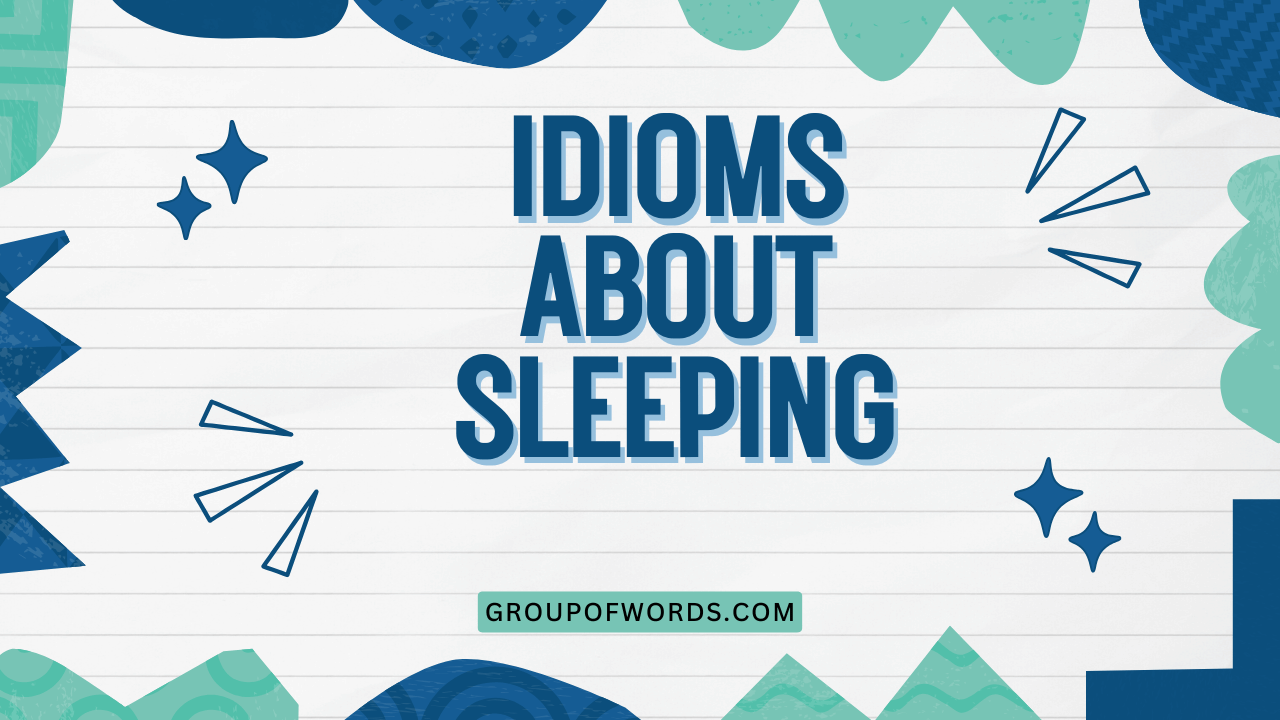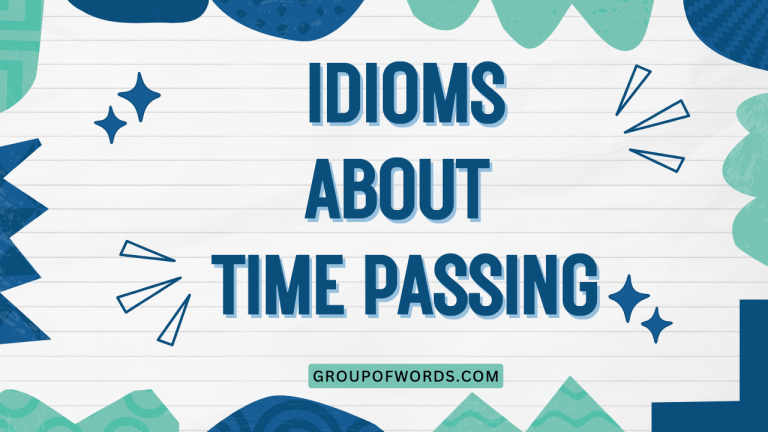Sleeping Idioms: Mastering English Expressions About Sleep
Idioms add color and nuance to the English language, making conversations more engaging and expressive. Among the many types of idioms, those related to sleep are particularly common and useful.
Understanding these idioms can significantly improve your comprehension of spoken and written English, allowing you to grasp the subtle meanings and cultural contexts in which they are used. This article will comprehensively explore various idioms about sleeping, providing definitions, examples, usage rules, and practice exercises to help you master this fascinating aspect of English vocabulary.
Whether you’re an ESL student, a language enthusiast, or simply looking to refine your communication skills, this guide will equip you with the knowledge and confidence to use sleeping idioms effectively.
Table of Contents
- Introduction
- Definition of Sleeping Idioms
- Structural Breakdown
- Types and Categories of Sleeping Idioms
- Examples of Sleeping Idioms
- Usage Rules for Sleeping Idioms
- Common Mistakes with Sleeping Idioms
- Practice Exercises
- Advanced Topics
- Frequently Asked Questions
- Conclusion
Definition of Sleeping Idioms
Sleeping idioms are expressions that use sleep-related words or concepts to convey a meaning different from the literal one. These idioms often describe states of rest, inactivity, unawareness, or even death metaphorically.
Unlike literal phrases, idioms rely on a collective understanding of their figurative meaning within a specific culture or language community. They add richness and depth to communication, allowing speakers and writers to express complex ideas in a concise and vivid manner.
Understanding sleeping idioms is essential for mastering English because they appear frequently in everyday conversations, literature, and media.
The function of sleeping idioms extends beyond mere vocabulary enrichment. They provide a way to express emotions, attitudes, and perspectives subtly and creatively.
For instance, saying someone is “sleeping on the job” is a more evocative way of indicating negligence than simply stating that they are not working. Similarly, “let sleeping dogs lie” suggests avoiding conflict or stirring up trouble, a message that might be less impactful if conveyed directly.
These idioms are deeply ingrained in the English language and reflect cultural attitudes towards rest, work, and interpersonal relationships.
Sleeping idioms can be classified based on their thematic focus. Some describe the act of falling asleep, others the state of being asleep, and still others the difficulty or ease of sleeping.
They can also be categorized by their level of formality, ranging from casual expressions used in informal settings to more formal phrases found in written texts. Recognizing these different types and categories can help learners use idioms appropriately and effectively in various contexts.
Structural Breakdown
The structure of sleeping idioms varies widely, but certain patterns are common. Many idioms consist of a verb related to sleep (e.g., sleep, doze, nap) combined with prepositions, adverbs, or other nouns to create a figurative meaning. For example, “sleep through something” combines the verb “sleep” with the preposition “through” to indicate a failure to notice or be affected by something. Other idioms may use sleep-related nouns metaphorically, such as “catnap” for a short, light sleep.
Understanding the structural elements of idioms can help learners decipher their meanings more easily. Breaking down an idiom into its component parts and considering the figurative associations of each part can provide clues to the overall meaning.
However, it’s important to remember that idioms cannot be understood literally; their meaning is derived from the specific combination of words and their established usage.
Here are a few common structural patterns found in sleeping idioms:
- Verb + Preposition: Sleep on it, sleep through, drop off to sleep
- Noun + Verb: Hit the hay, catch some Z’s
- Adjective + Noun: Sound asleep, dead to the world
- Phrasal Verb: Nod off, doze off
By recognizing these patterns, learners can more effectively analyze and understand new sleeping idioms they encounter.
Types and Categories of Sleeping Idioms
Sleeping idioms can be grouped into several categories based on the specific aspect of sleep they describe. Here’s a breakdown of the main types:
Idioms About Falling Asleep
These idioms describe the process of entering a state of sleep. They often convey the ease, speed, or suddenness with which someone falls asleep.
Idioms About Being Asleep
These idioms describe the state of being in a deep or sound sleep. They often emphasize the depth or intensity of the sleep.
Idioms About Difficulty Sleeping
These idioms describe the experience of struggling to fall asleep or stay asleep. They often express frustration or restlessness.
Idioms About Oversleeping
These idioms describe the act of sleeping longer than intended or necessary. They often imply being late or missing something important.
Idioms About Pretending to Sleep
These idioms describe the act of feigning sleep, often to avoid a situation or responsibility.
Idioms About Quality of Sleep
These idioms describe the quality of sleep, whether it is restful and deep or restless and disturbed.
Examples of Sleeping Idioms
This section provides a comprehensive list of sleeping idioms, categorized by their meaning and usage. Each idiom is accompanied by a definition and example sentences to illustrate its use in context.
The following table presents idioms related to falling asleep. Understanding these expressions will help you describe how easily or quickly someone drifts off to sleep.
| Idiom | Definition | Example Sentence |
|---|---|---|
| Drop off to sleep | To fall asleep, often unintentionally | I was watching TV and dropped off to sleep on the couch. |
| Nod off | To fall asleep briefly, especially while sitting | The lecture was so boring that half the students were nodding off. |
| Doze off | To fall into a light sleep | He dozed off in his armchair after a long day at work. |
| Drift off to sleep | To gradually fall asleep | She drifted off to sleep listening to soft music. |
| Fall asleep like a log | To fall asleep very quickly and deeply | After the marathon, he fell asleep like a log. |
| Be out like a light | To fall asleep immediately and deeply | As soon as his head hit the pillow, he was out like a light. |
| Succumb to slumber | To give in to the need for sleep | Exhausted from the trip, she quickly succumbed to slumber. |
| Go to the land of nod | To go to sleep | It’s time to go to the land of nod; goodnight! |
| Hit the hay/sack | To go to bed | I’m exhausted, I’m going to hit the hay. |
| Turn in | To go to bed | I usually turn in around 10 pm on weekdays. |
| Call it a night | To end the day and go to bed | It’s getting late, let’s call it a night. |
| Catch some Z’s | To sleep | I need to catch some Z’s before the big game tomorrow. |
| Get some shut-eye | To sleep | I’m going to get some shut-eye; I have an early start. |
| Go night-night | To go to sleep (often used with children) | Time to go night-night, little one. |
| Crash out | To fall asleep suddenly and deeply, often due to exhaustion | After working two shifts, he just crashed out on the couch. |
| Go to sleep on | To delay making a decision until the next day | I’m not sure about the offer; I’ll go to sleep on it. |
| Bite the pillow | To try to sleep but can’t | I was so nervous I spent the night biting the pillow. |
| Snuggle down | To make oneself comfortable in bed, ready to sleep | She snuggled down under the covers and closed her eyes. |
| Tuck oneself in | To make oneself comfortable in bed, as if being tucked in. | He tucked himself in and turned off the light. |
| Count sheep | To try to fall asleep by imagining counting sheep | I couldn’t fall asleep, so I tried to count sheep. |
The following table provides idioms about the state of being asleep. These idioms often convey the depth or intensity of the sleep.
| Idiom | Definition | Example Sentence |
|---|---|---|
| Sound asleep | Sleeping deeply | The baby was sound asleep in her crib. |
| Fast asleep | Sleeping deeply | He was fast asleep by the time I got home. |
| Dead to the world | Sleeping very deeply and unaware of surroundings | She was so tired she was dead to the world. |
| Out cold | Sleeping very deeply, often due to exhaustion or medication | After the surgery, he was out cold for several hours. |
| Sleeping like a baby | Sleeping very peacefully and soundly | He’s been sleeping like a baby ever since we got back from vacation. |
| Sawing logs | Snoring loudly | My roommate was sawing logs all night. |
| In the arms of Morpheus | Asleep (Morpheus is the Greek god of dreams) | She was finally in the arms of Morpheus after a stressful day. |
| Sleeping the sleep of the just | Sleeping soundly because one has a clear conscience | After helping the community, he slept the sleep of the just. |
| Lost to the world | Completely unaware of one’s surroundings due to sleep | He was lost to the world, dreaming peacefully. |
| Hibernating | Sleeping for a long period, like an animal in winter | It felt like he was hibernating all weekend. |
| Sleeping on it | Postponing a decision until the next day to consider it further | I’m not sure about the offer; I’ll sleep on it and let you know tomorrow. |
| Out for the count | Deeply asleep and unresponsive | He was out for the count after the exhausting climb. |
| In a deep slumber | Sleeping very soundly | The princess was in a deep slumber, waiting for her prince. |
| Dead to the world | Sleeping so soundly that one is unaware of anything happening around them. | After the marathon, he was dead to the world. |
| Sleeping like a rock | Sleeping very soundly and not easily disturbed. | She was sleeping like a rock and didn’t hear the storm. |
| In dreamland | Experiencing dreams while asleep | He was in dreamland, smiling in his sleep. |
| Slumberland | A metaphorical place representing sleep | He’s already in Slumberland. |
| In a coma | A prolonged state of unconsciousness resembling deep sleep | After the accident, he was in a coma for several weeks. |
| Resting one’s eyes | Taking a short nap | I’m just resting my eyes for a few minutes. |
| Out of it | Drowsy or not fully alert, often due to lack of sleep | She was out of it all morning after a sleepless night. |
The following table illustrates idioms used to describe difficulty sleeping. These expressions often convey frustration or restlessness.
| Idiom | Definition | Example Sentence |
|---|---|---|
| Lose sleep over something | To worry about something so much that you can’t sleep | Don’t lose sleep over such a small problem. |
| Toss and turn | To move around restlessly in bed, unable to sleep | I was tossing and turning all night, worried about the exam. |
| Not sleep a wink | To not sleep at all | I didn’t sleep a wink last night because of the noise. |
| Wide awake | Fully alert and unable to fall asleep | Even though it was late, I was wide awake. |
| Stay up all night | To remain awake for the entire night | I had to stay up all night to finish the project. |
| Burn the midnight oil | To work or study late into the night | I had to burn the midnight oil to prepare for the presentation. |
| Have a sleepless night | To be unable to sleep during the night | I had a sleepless night worrying about my job. |
| Can’t get a wink of sleep | To be unable to sleep at all | I can’t get a wink of sleep when there’s so much noise. |
| Stare at the ceiling | To lie awake in bed, unable to sleep | I spent hours staring at the ceiling, trying to fall asleep. |
| Eyes wide open | Unable to fall asleep | Even though I was tired, I lay there with my eyes wide open. |
| Wrestling with sleep | Struggling to fall asleep | I spent hours wrestling with sleep, but I couldn’t drift off. |
| Not able to switch off | Unable to relax and fall asleep | I was so stressed that I wasn’t able to switch off and get some sleep. |
| Up with the lark | Waking up very early in the morning (often due to difficulty sleeping) | I was up with the lark this morning, even though I didn’t want to be. |
| Sleep evades | Unable to fall asleep | Sleep evades him when he is nervous. |
| Bite the pillow | Stay awake all night due to worries | I spent the night biting the pillow, thinking about problems. |
| Be kept awake by | Unable to sleep due to noise or other disturbances | I was kept awake by the loud music next door. |
| Lie awake | To remain awake in bed when you are trying to sleep | I lie awake for hours sometimes, thinking about everything. |
| A restless night | When you can’t sleep properly | I had a restless night before my interview. |
| Be as wakeful as an owl | To be very awake and alert at night | She is as wakeful as an owl and loves to read at night. |
| Stay awake until the cows come home | To stay awake for a very long time | We stayed awake until the cows came home chatting. |
This table lists idioms related to oversleeping. These idioms often imply being late or missing something important.
| Idiom | Definition | Example Sentence |
|---|---|---|
| Sleep in | To sleep later than usual | I like to sleep in on weekends. |
| Oversleep | To sleep longer than intended | I overslept and missed my appointment. |
| Sleep through something | To sleep while something is happening, without being aware of it | I slept through the entire thunderstorm. |
| Miss the boat | To miss an opportunity because you were too late | If you don’t apply now, you’ll miss the boat. |
| Rise and shine | Time to wake up and get out of bed (often used humorously or sarcastically when someone has overslept) | Rise and shine! You’re late for work! |
| Hit the snooze button | To postpone waking up by pressing the snooze button on an alarm clock | I hit the snooze button three times this morning. |
| Sleep past | To sleep longer than a scheduled time. | I slept past my alarm and was late for the meeting. |
| Be caught napping | To be caught unaware or unprepared | The company was caught napping when the new technology was introduced. |
| Sleep on the job | To be inattentive or negligent in one’s duties | The security guard was accused of sleeping on the job. |
| Drowsy in the driver’s seat | Being sleepy or inattentive while driving | The car accident was caused by a drowsy driver in the driver’s seat. |
| Be a late riser | To wake up late in the morning | He is a late riser and doesn’t usually get up before noon. |
| Sleep one’s life away | To spend too much time sleeping instead of doing other things | You can’t sleep your life away; you need to get out and do something. |
| Wake up on the wrong side of the bed | To be in a bad mood when you wake up | He must have woken up on the wrong side of the bed this morning; he’s been grumpy all day. |
| Miss the bus | To miss an opportunity because you were too late | If you don’t apply now, you’ll miss the bus. |
| Be dead to the world | Sleeping so deeply that one is unaware of anything happening around them and misses out on events. | He was so dead to the world that he missed the party. |
| Sleep through a storm | To sleep so soundly that one is unaware of a storm. | She slept through the storm and didn’t even know it had rained. |
| Miss the deadline | To fail to submit something on time due to oversleeping or being inattentive. | He missed the deadline because he overslept. |
| Let the grass grow under one’s feet | To delay or be slow in taking action | Don’t let the grass grow under your feet; apply for the job now. |
| Sleep away | To spend time sleeping instead of doing something else | I sleep away my days on weekends. |
| Be caught off guard | To be surprised or unprepared for something | The company was caught off guard by the sudden market change. |
The following table provides idioms related to pretending to sleep. These idioms often describe the act of feigning sleep to avoid a situation or responsibility.
| Idiom | Definition | Example Sentence |
|---|---|---|
| Play possum | To pretend to be asleep or unconscious to avoid a situation | When his parents came in, he played possum to avoid getting in trouble. |
| Feigning sleep | Pretending to be asleep | The child was feigning sleep to avoid eating his vegetables. |
| Pretend to be asleep | Act as if one is sleeping | She pretended to be asleep so her roommate wouldn’t bother her. |
| Fake sleep | To simulate being asleep | He tried to fake sleep when his mom checked on him. |
| Pull the wool over someone’s eyes | To deceive someone by pretending | He tried to pull the wool over her eyes by faking sleep, but she knew he was awake. |
| Sham sleep | False or deceptive sleep | The toddler engaged in sham sleep, closing his eyes tightly. |
| Put on an act | To behave in a way that is not genuine | He was just putting on an act when he pretended to be asleep. |
| Act like one is asleep | To behave as if one is sleeping | She acted like she was asleep to avoid answering the question. |
| Simulate sleep | To imitate the act of sleeping | The spy simulated sleep to eavesdrop on the conversation. |
| Give the impression of being asleep | To create the appearance of sleeping | He tried to give the impression of being asleep so he wouldn’t have to do chores. |
The following table contains idioms related to quality of sleep.
| Idiom | Definition | Example Sentence |
|---|---|---|
| Get a good night’s sleep | To sleep well and feel rested | I need to get a good night’s sleep before the big day. |
| Sleep like a log | To sleep very soundly | I slept like a log and woke up feeling refreshed. |
| Rest easy | To sleep peacefully without worries | You can rest easy knowing that everything is taken care of. |
| Wake up refreshed | To wake up feeling rested and energized | After a good night’s sleep, I woke up refreshed. |
| Have sweet dreams | To have pleasant dreams while sleeping | Have sweet dreams! See you in the morning. |
| Get one’s beauty sleep | To sleep well in order to look good | I need to get my beauty sleep before the party tomorrow. |
| A sound sleeper | Someone who sleeps deeply and is not easily disturbed | She is a sound sleeper and can sleep through anything. |
| Sleep tight | Sleep well (often used as a farewell) | Sleep tight! Don’t let the bedbugs bite! |
| Have a fitful sleep | To have a restless or disturbed sleep | I had a fitful sleep last night due to the storm. |
| Tossing and turning all night | Unable to sleep properly | I was tossing and turning all night worrying about my presentation. |
Usage Rules for Sleeping Idioms
Using sleeping idioms correctly requires an understanding of their specific meanings and contexts. Here are some general rules to follow:
- Understand the meaning: Before using an idiom, make sure you understand its precise meaning. Misusing an idiom can lead to confusion or miscommunication.
- Consider the context: Idioms are often informal and may not be appropriate in formal settings. Consider your audience and the overall tone of the communication.
- Use them naturally: Idioms should be integrated seamlessly into your speech or writing. Avoid forcing idioms into sentences where they don’t fit naturally.
- Be aware of regional variations: Some idioms may be more common in certain regions or dialects of English. Be mindful of your audience’s familiarity with the idiom.
- Practice: The best way to master idioms is to practice using them in various contexts. Pay attention to how native speakers use idioms and try to incorporate them into your own communication.
Exceptions and Special Cases:
- Some idioms have variations in wording, but the meaning remains the same (e.g., “hit the hay” vs. “hit the sack”).
- Certain idioms may have double meanings, so it’s important to consider the context to determine the intended meaning.
- Some idioms are considered archaic or outdated and may not be commonly used in modern English.
Common Mistakes with Sleeping Idioms
Learners often make mistakes when using sleeping idioms due to literal interpretations or confusion with similar expressions. Here are some common errors to avoid:
| Incorrect | Correct | Explanation |
|---|---|---|
| I lost my sleep about the exam. | I lost sleep over the exam. | The correct idiom is “lose sleep over something,” not “lose sleep about.” |
| He slept through the boat. | He missed the boat. | “Slept through the boat” is a literal interpretation; the idiom is “miss the boat.” |
| She is sleeping as a baby. | She is sleeping like a baby. | The correct idiom is “sleeping like a baby,” not “sleeping as a baby.” |
| I will sleep on it at night. | I will sleep on it. | The idiom “sleep on it” already implies doing so overnight. |
| He said to rise and light. | He said to rise and shine. | The correct idiom is “rise and shine,” not “rise and light.” |
| Turn myself in. | Turn in. | “Turn in” already implies going to bed. |
| Catching some zee. | Catch some Z’s. | The correct idiom is “Catch some Z’s,” not “Catching some zee.” |
| Get some shut-eyes. | Get some shut-eye. | The correct idiom is “Get some shut-eye,” not “Get some shut-eyes.” |
| She was dead from the world. | She was dead to the world. | The correct idiom is “dead to the world,” not “dead from the world.” |
| I didn’t sleep any wink. | I didn’t sleep a wink. | The correct idiom is “I didn’t sleep a wink,” not “I didn’t sleep any wink.” |
Practice Exercises
Test your understanding of sleeping idioms with these practice exercises. Choose the correct idiom to complete each sentence.
Exercise 1: Fill in the Blanks
| Question | Answer |
|---|---|
| 1. After the long journey, he ___________ as soon as his head hit the pillow. | was out like a light |
| 2. I couldn’t ___________ last night because of the loud music. | sleep a wink |
| 3. I’m not sure about the job offer; I’ll ___________ and decide tomorrow. | sleep on it |
| 4. She ___________ and missed her flight. | overslept |
| 5. He ___________ to avoid doing the dishes. | played possum |
| 6. I need to ___________ before the marathon tomorrow. | get a good night’s sleep |
| 7. The baby is ___________ in her crib. | sound asleep |
| 8. I’m going to ___________; I’m exhausted. | hit the hay |
| 9. He ___________ during the boring lecture. | nodded off |
| 10. I often ___________ on weekends to catch up on rest. | sleep in |
Exercise 2: Multiple Choice
| Question | Options | Answer |
|---|---|---|
| 1. Which idiom means to worry so much that you can’t sleep? | (a) Sleep like a log (b) Lose sleep over something (c) Hit the sack (d) Call it a night | (b) Lose sleep over something |
| 2. Which idiom means to pretend to be asleep? | (a) Sleep in (b) Oversleep (c) Play possum (d) Call it a night | (c) Play possum |
| 3. Which idiom means to go to bed? | (a) Sleep on it (b) Hit the hay (c) Sleep through (d) Lose sleep | (b) Hit the hay |
| 4. Which idiom means to sleep very soundly? | (a) Sleep like a baby (b) Burn the midnight oil (c) Stay up all night (d | (a) Sleep like a baby |
Advanced Topics
For advanced learners, exploring the etymology and cultural significance of sleeping idioms can provide deeper insights into the English language. Many idioms have historical roots or cultural references that add layers of meaning to their usage.
For example, the idiom “in the arms of Morpheus” references the Greek god of dreams, Morpheus, adding a poetic and mythological dimension to the expression.
Another advanced topic is the use of sleeping idioms in literature and media. Authors and screenwriters often use idioms to create vivid imagery, convey character traits, and add authenticity to dialogue.
Analyzing how idioms are used in different genres and contexts can enhance your understanding of their versatility and impact.
Furthermore, comparing sleeping idioms across different languages can reveal interesting cultural perspectives on sleep and rest. While some idioms may have direct equivalents in other languages, others may be unique to English or reflect specific cultural attitudes.
Frequently Asked Questions
Why are idioms important in learning English?
Idioms are crucial because they are frequently used in everyday conversations, literature, and media. Understanding idioms allows you to comprehend the nuances of the English language and communicate more effectively.
How can I improve my understanding of idioms?
To improve your understanding of idioms, read widely, listen to native speakers, and practice using idioms in your own speech and writing. Pay attention to the context in which idioms are used and look up any unfamiliar expressions.
Are idioms the same in all English-speaking countries?
No, idioms can vary across different English-speaking countries and regions. Some idioms may be more common in certain dialects or cultures.
Be aware of these regional variations when using idioms.
Is it okay to use idioms in formal writing?
In general, idioms are more appropriate for informal speech and writing. In formal contexts, it’s best to use more direct and literal language.
However, some idioms may be acceptable in certain formal settings if they are widely understood and do not detract from the overall tone.
How can I avoid misusing idioms?
To avoid misusing idioms, always double-check their meaning and usage before incorporating them into your speech or writing. Pay attention to the specific wording of the idiom and avoid making substitutions or alterations.
Conclusion
Mastering sleeping idioms is an enriching journey that enhances your understanding and appreciation of the English language. By learning the definitions, usage rules, and common mistakes associated with these expressions, you can communicate more effectively and confidently in various contexts.
Whether you’re describing the act of falling asleep, the state of being asleep, or the difficulty of sleeping, sleeping idioms provide a colorful and nuanced way to express yourself. Continue practicing and exploring these idioms to unlock their full potential and elevate your English language skills.






